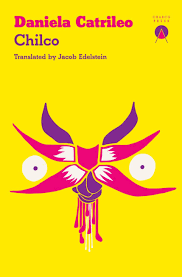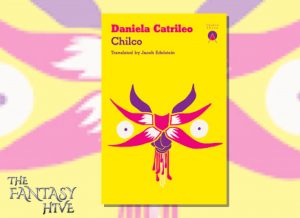CHILCO by Daniela Catrileo, translated by Jacob Edelstein (BOOK REVIEW(
Daniela Catrileo – Chilco (2023, Translated by Jacob Edelstein 2025)
“No matter what I do, the smell returns like an echo, a resonance, as if the scents were also a soundwave reverberating around me. Sometimes I feel like I live in the tiny mould spores; like a piece of fruit rotting, I rest in a fungal kingdom that’s consuming me. I’m getting sick, I can feel it inside.”
Chilco is Mapuche writer Daniela Catrileo’s first novel, and her first book to be translated into English. It’s a remarkable work of near-future speculative fiction that grapples with the legacy of colonialism and the collapse of capitalism. Catrileo achieves this by exploring the relationship between her two main characters, Marina and Pascale. By exploring the ways in which the forces of climate change, late period capitalism and the legacies of colonialism warp individual lives, Chilco wonderfully demonstrates that the personal is always political. Jacob Edelstein’s translation beautifully captures Catrileo’s lyrical eloquence, and the novel is a great example of the wonderful work Charco Press do bringing Latin American literature to Anglophone readers.
 Marina has just moved with her partner Pascale to Chilco, the island where Pascale was born and grew up. They have fled Capital City, where Mari has lived her whole life, after a revolution against the bankers and landowners is scuppered by sinkholes, neglect and climate change. Pascale sees an opportunity to escape the crushing poverty of the mainland and return to the paradise of his youth, but Mari finds herself unable to accept her new environment. In her safe home she cannot escape the smell of rot. No one else can see it, but to Mari, the album is decaying around her. As the situation on the mainland deteriorates, the stress of adapting to life on Chilco starts to put pressure on Marina and Pascale’s relationship.
Marina has just moved with her partner Pascale to Chilco, the island where Pascale was born and grew up. They have fled Capital City, where Mari has lived her whole life, after a revolution against the bankers and landowners is scuppered by sinkholes, neglect and climate change. Pascale sees an opportunity to escape the crushing poverty of the mainland and return to the paradise of his youth, but Mari finds herself unable to accept her new environment. In her safe home she cannot escape the smell of rot. No one else can see it, but to Mari, the album is decaying around her. As the situation on the mainland deteriorates, the stress of adapting to life on Chilco starts to put pressure on Marina and Pascale’s relationship.
The narrative of Chilco is interlaced with the Chilco Archives, a collection of articles on the island’s plant life, geography, history and literature that Mari encounters over the course of the story, which give the fictional island a sense of being a real, lived-in place. The rest of the novel is narrated through Mari’s perspective, creating a non-linear narrative as she experiences life on the island and reminisces about her life growing up in Capital City. Mari grew up with her grandmother Flor and her mother Rosita, who run a neighbourhood market selling Andean food. Working class and descended from native Andean tribes, they experience racism both large and microaggressive from the population descended from the European colonisers. Their resistance takes the form of the indigenous words from Quechua and Aymara that they use in their everyday speech, that characterize Mari’s speech both in the novel and in the narrative itself. It also shapes Flor’s relentless work ethic, pouring all the energy she has into the market, and Mari’s desire to escape to a different type of life.
The novel’s speculative elements come to the fore in how it imagines the violent collapse of capitalism. Catrileo envisions a future in which the destructive cycle of late-period capitalism finally eats its tale. Pushed past breaking point by an economy that’s unliveable in, the working class of Capital City rise up and reclaim the land of the city from the bankers and government cronies who have sequestered all the city’s living space into their money-making schemes at the expense of the people. But the feeling of liberation and possibility is short lived, as the government contractors cut corners on expenses, creating a decaying infrastructure not capable of withstanding the pressures of climate change. Buildings collapse and sinkholes open up in the streets, leaving Mari and Pascale in an even more precarious position than previously, and ultimately forcing their move to Chilco. Catrileo shows that the end of capitalism will be long, drawn out and messy, and that it is the poor who will bare the brunt of the damage and suffering, as the rich are able to pack up and move to safer ground.
But there is a more subtle and numinous speculative element at work in Chilco’s pages. In her house in Chilco, where Mari is reflecting on all of this, she is constantly haunted by presences. These do not manifest as actual spirits, but instead in the sense that there is something ineffably wrong that she can never put her finger on. It’s in the smell of decay that follows her everywhere that no one else on the island can detect. It’s in the sense of loss she feels from being cut off from the mainland where she has lived all her life. She describes Chilco as being an absent organ, one that she lacks but everyone around her possesses, leaving her unable to properly process life on the island. Though she is out of the danger of the collapsing Capital City, Mari is still haunted by the legacies of capitalism and colonialism that warped and shaped her life. Catrileo’s novel is as much about how the wounds of colonialism are something that stay with a colonised people long after the empires and institutes themselves fall apart. Thus Chilco works as a post-colonial reimagining of the gothic, the colonial legacies of the past a haunting presence that extend their influence beyond the grave of their creators.
Catrileo expertly achieves all this through her microscopic examination of Mari and Pascale’s relationship as it begins to disintegrate. Mari is such a powerful viewpoint character, her voice is full of poetry and she is a keen observer of human behaviour from the outside, even as she can be quite blinkered about her own needs. The tragedy of their relationship is that they are very well suited and clearly care a great deal for each other, but Mari’s own self-sufficiency from years of being an outsider make it difficult for her to open up emotionally, whilst Pascale’s response to the crises both internal and external is to retreat into his own childhood, leaving Mari stranded. The novel builds to a surprising and deeply moving climax.
Chilco is an excellent work of speculative fiction. Catrileo has created a powerful and disconcerting work, one whose intellectual implications are matched by its perceptive character work. It demonstrates how Latin American authors are using elements of the speculative to build forms of literature that speak to their own unique perspectives and needs. And equally it demonstrates how these voices enrich the speculative and help it to evolve. Powerful and urgent, Chilco establishes Catrileo as an exciting and ambitious new author. I am grateful to Charco Press for bringing it to Anglophone readers.
Chilco is available now, you can order your copy on Bookshop.org

